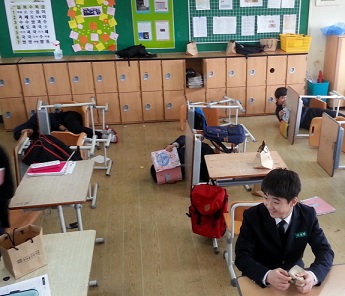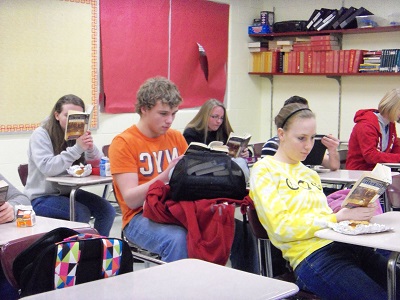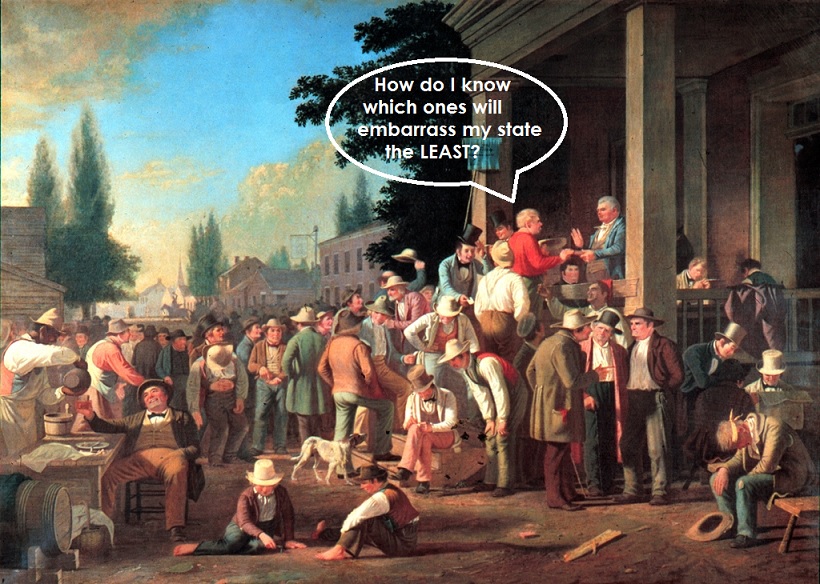 Our 3rd grade OCCT high stakes test starts Monday. This test, due to RSA and our Oklahoma legislature, requires our 8-year-old students to pass the test or being retained in 3rd grade (unless ridiculous and out of reach exemptions are met).
Our 3rd grade OCCT high stakes test starts Monday. This test, due to RSA and our Oklahoma legislature, requires our 8-year-old students to pass the test or being retained in 3rd grade (unless ridiculous and out of reach exemptions are met).
After cramming a year (or two, or three – depending on the child and circumstances) of learning into 6 months, and devoting the past six weeks to “test prep” across all of 3rd grade, our stress levels are beyond measure. Our students, their parents, teachers, administrators – it’s taken over our worlds, both at school and at home.
I left school yesterday, headed to the store, bought even more nutritional snacks for my class, trying to give that extra boost in hopes it might mean answering ONE MORE QUESTION correctly. I dropped them off at school and headed home to “relax and enjoy my weekend” as suggested by my principal. She knows me so well, we both laughed as she said it.
Mentally exhausted, I was asleep by 7. When I woke up to go to bed, I just lay there – for close to two hours – with my mind and heart racing. After drifting off to sleep, the nightmares started.
From dreaming about grades, being forced to eat mouthfuls of fat and gristle, fighting with staff members about the demands of our new reading curriculum, crawling on my hands and knees on the hallways at the state department begging to find out our scores that just came in and finding out all my students failed the test, and crying and screaming with my administrators as they were trying to calm me, my husband woke me up and asked what in the world was wrong because I kept moaning and crying in my sleep.
Waking up from a nightmare normally is a relief because you know it isn’t real. I didn’t feel relief this morning. Instead, my tongue, jaw, neck, and shoulders are sore from the pressure, my mind continues to race, and my heart is broken for my kids. They are my kids. I spend nearly every day with them. I know their fears, their worries, their joys, and their little quirks that make them who they are. They will always be my kids.
Test anxiety is real. If it were just me, I’d adapt. But can you imagine what my 8, 9, and 10 year-olds are dealing with? I pray for them – regularly. I ask for you to pray for them, too. Thank you.
Do you know what it’s like to look a child in the eyes while they ask if they are going to pass the test or not, and you don’t want to answer? When you’ve told them from day one that you’ll always be honest with them, but you also you know that because of their mental or physical disability, or their circumstances, or other realities beyond their control, their chances aren’t good?
It doesn’t matter that they’ve made such great gains, or that they’re now able to read words and books that they couldn’t before. It doesn’t matter that they’re becoming eager readers, finding excitement in books and gaining confidence in themselves. It doesn’t matter that they have so many gifts and so much potential. All that matters is a score on a one-time test that will decide if they’re “smart enough” or “good enough”.
So you say things like, “Just try your best. I’m proud of you. You’ve worked so hard, etc.” But deep down you know they will fail the test and that information will be shared with them by their parents, and their self esteem, their confidence will plummet–because of a high stakes test.
Sometimes it’s not about learning difficulties. By this time of year, many of our ‘regular’ students are beyond done. “Stick a fork in me,” their expressions say – “I’m D. O. N. E. Done duh-done done DONE.”
By the time they finish reading long pages of passage after passages, comparing poems to recipes to dictionary pages to newspaper articles to plays, by the time they’ve explained when to use a thesaurus vs. an encyclopedia vs. an almanac, glossary, or index – by that time they’ve sat for over an hour, completely still and completely quiet.
By that time they could care less about going back to paragraph 7 to compare the main idea to stanza 4 of the previous poem. They start filling in bubbles just to finish.
I can’t say that I blame them one bit. My 8-year-old mind probably would have done the same thing. Honestly, my 37-year-old brain would too.
There’s that kid who hurries and starts guessing because her classmates are starting to finish and she doesn’t want to be last and thought of as “dumb” by her classmates. She doesn’t want them staring at her in frustration because they can’t talk, read, or move until she’s done.
There’s that kid who raises her hand within 10 minutes saying she has finished the test. So by law, you have to turn it in.
There’s that creative soul who starts to see some type of pattern or picture in the answers and finishes coloring in the bubbles to create that dragon.
There’s that kid who’s being neglected, probably sidetracked about where they’ll be going after school, what they’ll find to eat for dinner, or worried about mom that was hit by her boyfriend the night before. That kid that fills your thoughts every evening, whose name is well-known by your spouse, and who you cry over and pray for. That kid’s taking the same test.
There are several of them who are doing great, but simply progress at a slower rate. They’re not Pop Tarts. Some require “bake” time.
Our legislators presume to know what’s best for our kids. I beg them to come visit while I monitor my kids during testing. I want them to see first-hand what it’s like. I beg them to come throughout the year, on that first day of school, when my kids are asking when the state test is, or sit with me during conferences when parents are crying and asking me how they can help their child get ready for the test. The test is federal law, but the high stakes portion of it is the sole fault of our Oklahoma legislators.
I didn’t really understand the damage the wrong sorts of testing can do until I started teaching 3rd grade. It’s not good for kids and accomplishes nothing for educators. You can argue it’s a necessary evil but I assure you, that’s only half-true.
It’s not at all necessary.

 There’s a cliché in education about teaching the child, not merely the subject. The more annoying version is that students don’t care how much you know until they know how much you care. I’m not in love with either platitude, but like most things with unfortunate sticking power, they’re not entirely wrong.
There’s a cliché in education about teaching the child, not merely the subject. The more annoying version is that students don’t care how much you know until they know how much you care. I’m not in love with either platitude, but like most things with unfortunate sticking power, they’re not entirely wrong.

 Her 1st Period class is Biology 101 and has 34 students (this is obviously pre-budget cuts). Just under half are pretty much getting it and will hopefully do fine on the Big Test. Their actual enthusiasm for truly understanding science varies widely, but whatever.
Her 1st Period class is Biology 101 and has 34 students (this is obviously pre-budget cuts). Just under half are pretty much getting it and will hopefully do fine on the Big Test. Their actual enthusiasm for truly understanding science varies widely, but whatever.  Ms. Endocrine could put more time and energy into figuring out what’s behind all of this, but she has 147 other students, many of whom DO show up and need regular attention. If it’s left on her, she’ll have to either ignore the absences or issue standardized consequences – detention. Suspension. ‘F’.
Ms. Endocrine could put more time and energy into figuring out what’s behind all of this, but she has 147 other students, many of whom DO show up and need regular attention. If it’s left on her, she’ll have to either ignore the absences or issue standardized consequences – detention. Suspension. ‘F’.  Except the research says dozens of other factors impact how or even if kids learn. The science says it matters how we adjust to actual, real students in front of us, whether we wish it were necessary or not. Ms. Endocrine COULD just teach the material. If they refuse to learn for whatever reason, she could give logical consequences – detention. Suspension. ‘F’.
Except the research says dozens of other factors impact how or even if kids learn. The science says it matters how we adjust to actual, real students in front of us, whether we wish it were necessary or not. Ms. Endocrine COULD just teach the material. If they refuse to learn for whatever reason, she could give logical consequences – detention. Suspension. ‘F’.  One girl’s mom is sick – really sick. Two kids have undiagnosed ADD or OCD or some sort of acronym making things difficult all ‘round. Judy needs glasses, but keeps not getting them. A few are probably under the influence of something illegal, far too many are scarred by some form of sexual abuse in their recent past, and it’s pretty obvious to everyone that Gary has SERIOUS anger issues he doesn’t know how to control.
One girl’s mom is sick – really sick. Two kids have undiagnosed ADD or OCD or some sort of acronym making things difficult all ‘round. Judy needs glasses, but keeps not getting them. A few are probably under the influence of something illegal, far too many are scarred by some form of sexual abuse in their recent past, and it’s pretty obvious to everyone that Gary has SERIOUS anger issues he doesn’t know how to control.  So we hire extra counselors, partnering with outside organizations when we can and eating the cost ourselves when we can’t. We create separate classrooms or activities and find specialized staff to mitigate the outside realities we can’t directly control.
So we hire extra counselors, partnering with outside organizations when we can and eating the cost ourselves when we can’t. We create separate classrooms or activities and find specialized staff to mitigate the outside realities we can’t directly control.  It’s about trying to teach kids Biology, and English, and Math – things we can’t do without some regard for who we’re trying to teach and what they’ve brought with them that might get in the way. If it were as simple as just delivering content, we could pack them in the gym and show a video lecture each day. Even better, just send a DVD home with them – see you when it’s time to assess.
It’s about trying to teach kids Biology, and English, and Math – things we can’t do without some regard for who we’re trying to teach and what they’ve brought with them that might get in the way. If it were as simple as just delivering content, we could pack them in the gym and show a video lecture each day. Even better, just send a DVD home with them – see you when it’s time to assess.
 Teenagers are weird.
Teenagers are weird. What threw me, though, was seeing the remaining two-thirds of my kids standing near their toppled desks, looking bewildered – a tad annoyed, maybe a bit hurt as well. Clearly, however, at a complete loss as to what to do.
What threw me, though, was seeing the remaining two-thirds of my kids standing near their toppled desks, looking bewildered – a tad annoyed, maybe a bit hurt as well. Clearly, however, at a complete loss as to what to do.  No headphones were loud enough to produce bug-beats (the pinched, high-pitch drum noises you get from ear buds when the music is too loud), and most students seemed to be engaged. It was strangely quiet.
No headphones were loud enough to produce bug-beats (the pinched, high-pitch drum noises you get from ear buds when the music is too loud), and most students seemed to be engaged. It was strangely quiet. I refused to look up and react, because – and this is what’s so ridiculous – I had no idea whether they were messing with me or not.
I refused to look up and react, because – and this is what’s so ridiculous – I had no idea whether they were messing with me or not.  A student – sometimes with an ally or two, sometimes not – is off-topic and talking or otherwise creating sounds they should not be creating. (There are plenty of opportunities to be active and engaged and rowdy and such in my class, but at other times that the opposite is necessary.) In the most egregious examples, animated conversations are being propagated right up to the point I manage to get their attention by calling their name(s) or throwing small objects at them.
A student – sometimes with an ally or two, sometimes not – is off-topic and talking or otherwise creating sounds they should not be creating. (There are plenty of opportunities to be active and engaged and rowdy and such in my class, but at other times that the opposite is necessary.) In the most egregious examples, animated conversations are being propagated right up to the point I manage to get their attention by calling their name(s) or throwing small objects at them. “See?! SEEEEEE?!?!?!!” it says – “I have a piece of paper in my hands and I am WAVING it! WAVING IT VIGOROUSLY! Clearly this would not be possible had I been engaging in the sorts of shenanigans you so cruelly and unfairly suggest! Ha! WAVE it I do! WAVE! WAVE!”
“See?! SEEEEEE?!?!?!!” it says – “I have a piece of paper in my hands and I am WAVING it! WAVING IT VIGOROUSLY! Clearly this would not be possible had I been engaging in the sorts of shenanigans you so cruelly and unfairly suggest! Ha! WAVE it I do! WAVE! WAVE!”
 I wanted to compile a short list of talking points, a resource for educators or parents willing to encourage others to get more involved in state elections but unsure what to say. My goal was for it to be succinct, informative, and relatively free of tone and attitude, so as to be more palatable to the masses.
I wanted to compile a short list of talking points, a resource for educators or parents willing to encourage others to get more involved in state elections but unsure what to say. My goal was for it to be succinct, informative, and relatively free of tone and attitude, so as to be more palatable to the masses. March 1st was, as you were probably aware, the date of the Presidential Primary in Oklahoma. That’s a whole other descent into madness we won’t worry about here.
March 1st was, as you were probably aware, the date of the Presidential Primary in Oklahoma. That’s a whole other descent into madness we won’t worry about here. Statewide elections are on the same date – November 8, 2016 – as national elections.
Statewide elections are on the same date – November 8, 2016 – as national elections. 